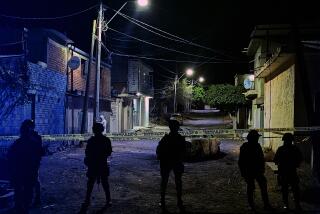Home Beckons, but Iraq Duty Takes Priority
On slow afternoons, Pfc. Jose Velasquez pores over books. A while back it was “Slaughterhouse-Five,” Kurt Vonnegut’s novel of war and trauma. On Tuesday, he was well into F. Scott Fitzgerald’s “The Great Gatsby” and thinking of a life beyond the confines of his dusty base in southern Baghdad.
“Of course, I would love to get home,” said the 19-year-old Riverside native. “But we still got a job to do here. We can’t leave before it’s finished.”
In a series of brief interviews, soldiers of the Army’s 4th Brigade, 3rd Infantry Division expressed disappointment over news of declining public support and increasing public regret for a military mission that has cost the lives of more than 1,700 fellow soldiers, Marines and sailors.
“We’ve all lost friends here,” said 1st Lt. Benjamin Johnson, 25, of Minneapolis. “It would be a shame if we got out too soon. They would have died in vain.”
American troops supported President Bush in greater numbers than their fellow citizens during the 2004 election, according to polls before the balloting. Those who oppose U.S. foreign policy tend to keep quiet. But whatever their views and backgrounds, they react with raw emotion to the suggestion that the United States should pull out of Iraq quickly.
“Everything that we worked for would be gone,” said Pfc. Kishon Wright, a 20-year-old native of Newark, N.J. “If the U.S. were to pull out too soon, the insurgents would take over the country the next day.”
The dozen or so soldiers interviewed on a base called Camp Falcon and during a brief mission with Iraqi soldiers in the capital’s Dora neighborhood said Americans should listen to Bush and stay the course. They also acknowledged that many things had gone wrong with counterinsurgency and reconstruction efforts and expressed doubts about Iraqis’ ability to take control of the country anytime soon.
The doubts spilled out during Operation Goodwill, a Tuesday morning public relations foray into the Dora neighborhood. As American soldiers watched, newly trained Iraqi soldiers handed out soccer balls to kids and distributed leaflets with phone numbers for reporting insurgent activity. Then an Iraqi soldier yelled at the children and slapped one on the back of the head.
American soldiers standing nearby sighed and shook their heads.
“They’re going from door to door,” said 1st Lt. Paul Cutts, 30, of Duluth, Minn. “They’re building relationships.”
But he added, “I don’t know if it’s working.”
Back at the base, Capt. David Benton, 37, of Colorado Springs, Colo., complained of Americans at home demanding that the situation in Iraq change overnight.
“Everyone wants instant gratification,” he said. “Of course, I want to see my daughter. I want to go back home. But who’s to say if we leave here too soon we won’t come back in a few years?”
Troops at times express frustration with the corruption and decay throughout Iraq. During a patrol through a Baghdad neighborhood, they can be heard cursing about the smell of rotting garbage and the able-bodied young men standing idly at midday. They question whether their help is doing any good, or whether their presence is causing more troubles than it is fixing.
“We’re nothing but targets out there,” said one noncommissioned officer.
“We’re always going to have to have a presence here. It’s never going to end.”
Bush has said the nation is at war. But the soldiers say that those not in the military sometimes do not seem aware of it.”They’re waiting in long lines at airports and occasionally have to take their shoes off,” said 1st Sgt. Frazier Norris, a 42-year-old native of Niagara Falls, N.Y. “Are they sacrificing like we are? No.”
Many of the soldiers here are serving their second tours of duty in Iraq. The 3rd Infantry Division was part of the force that invaded Baghdad in April 2003. Members of the division have sacrificed their lives for Iraq, and Iraq has wended its way into the identities of those who remain.
The shift in American opinion on the war has occasionally had a jarring effect on soldiers. One sergeant with 18 years in the service described his shock when his mother, a 20-year Army veteran, told him in a phone conversation Monday that she had turned against the war.
“She says she doesn’t agree with us being here any longer,” he said, speaking on condition of anonymity. “She also said she was still very proud of me. But it made me wonder what I’m doing here. What are these guys doing here?”
More to Read
Start your day right
Sign up for Essential California for news, features and recommendations from the L.A. Times and beyond in your inbox six days a week.
You may occasionally receive promotional content from the Los Angeles Times.






